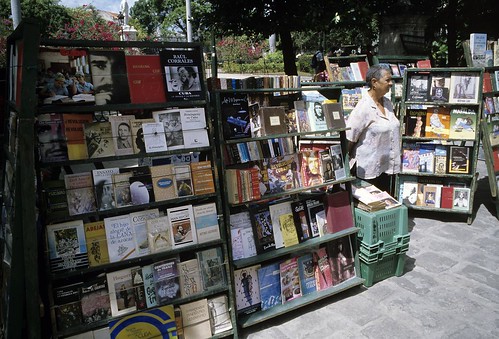
From an email in which I try to explain my reservations about e-book devices like the Amazon Kindle.
If these devices propagate information more thoroughly, that would be terrific. But the way they are being packaged is as a business plan for keeping newspapers and publishing houses solvent against the onslaught of digital media - i.e. an e-savior for businesses whose primary product has not been electronic. And I think the message that this will increase ready access to the written word for people who may not have it now is part of a marketing strategy to alleviate guilt in a group of people who both have strong convictions in the necessity of language & literature and a strong social conscience, and who also just so happen to be the target market for this device. Unless Amazon can alleviate the guilt, they won't be able to sell these people a Kindle.
A seduction, in other words. Like the Product Red program that "allows" people to buy highly discretionary items under the cover of making a (minuscule) donation to Africa. Absolution has become a major marketing tool in this era. In many ways, it is almost like the selling of indulgences by the church during the time of Erasmus.
Long way around, but what I think is this: don't by a red sweat shirt - send the entire purchase price to Africa and do without the sweat shirt entirely. Or set yourself an hourly rate where if you spend $100 on discretionary items, you then need to work in community service for 5 hours at an imagined $20/hour.
The language associated with e-books is the same language associated with computers 20 years ago, and yet there still isn't the democratic device in terms of computers. The OLPC is trying, but it faces many obstacles, the most complicated to solve being that the many people who would be its beneficiaries would benefit more highly from things like food, clean water and medicine.
As members of the first world, we, like Donald Rumsfeld, have a strong belief that technology is the answer to many of our issues. But as the AK-47 proves over and over again, sometimes technology pales in comparison to good old analog steel. Sometimes a book is just better. Longevity, durability, transportability, universality, etc. To read an e-book, you need electricity and an e-book reader compatible with that e-book's file system. To read a book, all you need is a little light.
If some sort of pay-to-play were worked out - Amazon and its brethren must provide unlimited access for public schools to every e-book produced in order to use the public airwaves to transmit its content to all the Kindles running through the NYC subway - I might feel more comfortable about it. Of course, they'd have to promise to keep all the e-book reader interfaces up and running. I know from many friends in academics that while school systems have little problem getting computers, maintenance is a whole other ball of wax. Lots of broken computers sitting in back closets waiting repair due to lack of funds or languishing unused due to obsolescence.
The reality is that the people who benefit most highly from e-books are the book manufacturers and Amazon. Warehousing and shipping books (along with the employees required to manage this process) must be a tremendous expense that not even just-in-time warehousing/publishing can offset sufficiently. E-books would create the possibility for greater control over profits for those entities, whether or not they would actually benefit the consumer. So all the rhetoric around e-books is suspect until the benefits to consumers can be shown to at least equal the desire of the producers to cut their overhead by eliminating warehousing, reducing employees, and cutting brick & mortar retailers out of the income stream.
Finally, because I like words and deal in their nuances, I can't ignore that while the word "kindle" can connote germination of an idea, it also means starting a small fire for the purposes of burning something larger and more resistant to flames. And that sense of the word is a bit too close to my flammable library.
I like technology and gadgets as much (or perhaps more) than the next guy. I am much more of a fan of the book publishing robot that the NY Public Library recently obtained. In 20 minutes, it can publish a book from an electronic file, allowing the library to dispense far more books in physical form that it could ever stack on its shelves. A physical book that can be read by anyone without the necessity of batteries or a device.